Rushden Echo, 1st January 1943, transcribed by Kay Collins
Two Hits - Rushden Lad in Algiers Hospital
Mr and Mrs Throssell, of 25, Glassbrook-road, Rushden, have received a letter from
Their son, Pte Jack Throssell, of the Northamptonshire Regiment, who was wounded on November 25th while in action in North Africa, and is now in hospital in Algiers.
Pte Throssell writes: “We caught up with Jerry and had a bit of a dust up. I was very lucky, as usual, and only got a couple of slight ones. I suppose we’ll have a good rest here before doing any more active service. I am going round the wards looking for my pals this morning, so you can see there’s not much wrong with me.”
Pte Throssell was also wounded in the left thigh at Dunkirk.
|
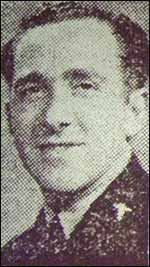 Rushden Echo, 1st January 1943, transcribed by Kay Collins Rushden Echo, 1st January 1943, transcribed by Kay Collins
Calling Home from Cairo – Rushden Airman will Broadcast Tonight
One of Rusden’s airmen serving overseas will he heard “on the air” to-night (Friday), when he will be speaking to his wife and other relatives in the programme “Cairo Calling” at 10p.m. He is Corpl. Charles Henry Kendall, eldest son of Mr and Mrs R Kendall of 160, Queen-street, Rushden, and husband of Mrs Joan Kendall, who resides at 52, Spencer-road. He joined the R.A.F. three years ago, is a doctor’s assistant on the R.A.F. Command Medical Board, and has been working hospitals.
Now in Egypt, he is himself recovering from an illness. He has been abroad for two years, having been to Africa and Palestine, so his relations will be very pleased to hear his voice once more after such a long absence.
Prior to joining up, Corpl. Kendall, who is 23, was employed in the clicking department of the C.W.S. boot factory, Rushden. He was a member of the St John Ambulance Brigade and of the Independent Wesleyan Church.
|
Rushden Echo, 1st January 1943, transcribed by Kay Collins
Dunkirk and Africa - War Record of Missing Rushden Soldier
News that her husband, Corporal George Dowsett, is reported missing, believed wounded, during fighting in North Africa has been received by Mrs Dowsett, of 1, Newman-street, Higham Ferrers.
Corpl. Dowsett, whose parents reside at 57 Sartoris-road, Rushden, joined the Northamptonshire regiment in July 1939, and has seen service in France, being in the Dunkirk epic. Prior to joining up he was employed by Messrs B Denton and Son, boot manufacturers, Rushden. He was married to Miss Joyce Boxall, of Higham Ferrers, twelve months ago.
|
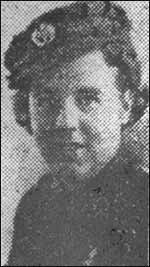 Rushden Echo, 8th January 1943, transcribed by Kay Collins Rushden Echo, 8th January 1943, transcribed by Kay Collins
Hopes to meet her Brother - Rushden ATS Girl Going Overseas
Hoping that she might be sent to the Middle East and meet her brother there, a Rushden A.T.S. girl Pte. Vera Travill, recently volunteered for service overseas. She is now on the water but her destination is not yet known.
Vera is the eldest daughter of Mr and Mrs H Travill, of 14, Trafford-road, Rushden, whose family has a fine record.
The father fought with the Northamptonshires during the last war and was for nearly four years in Egypt. The son in the Middle East is Gunner Eric Travill, Royal Artillery—he has been “out there” about two years. Another artilleryman son is Gunner Cecil Travill, now in Scotland. A daughter, Beryl, is in the Women’s Land Army, and the youngest son, Peter, has joined the Army Cadet Force.
Vera attended the Rushden Intermediate School and worked at the C.W.S. boot factory before joining the A.T.S. in August 1941.
|
Rushden Echo, 15th January, 1943, transcribed by Jim Hollis
Rushden Trooper Meets Tita in The Desert
This is the picture Mrs. W. A. Roberts, of 7, Orchard-place, Rushden, saw in the papers of her son, Edward (left), who is the gunner of a tank in the Western Desert. In a letter that Mrs. Roberts received on Christmas Day, her son told her to watch the papers, as he thought he would be “in the news.” His friends now see that he made a remarkable desert “capture” in the tiny person of Tita Rickards, member of a touring concert party.
To men who have not seen children for a long time, Tita came as a pleasant surprise, and she was immediately made very welcome. Gunner Roberts, who has been in the Army nearly three years, was formerly in the Sherwood Foresters, and had seen service in the Royal Tank Regiment abroad since May, 1942. He was employed in the office of Messrs. Wm. Green and Son, boot manufacturers.
|
Rushden Echo, 15th January, 1943, transcribed by Jim Hollis
“Missing” Soldier Writes Home - Pleasant Surprise for Rushden Parents
The recent official report that Pte. C. S. G. Mackness, of Rushden, was listed as missing on November 29th has had a surprising sequel – the arrival of a letter written by Pte.Mackness on December 9th.
In this letter to his parents, Mr. and Mrs. C. Mackness, of 87, Trafford-road, he said he had just come out of the line for a rest and was quite well, adding “Don’t worry if you don’t get a lot of letters.”
“Ask Dad to keep the pigeons in good fettle,” he wrote, “so we can have some more sport after this is all over.” He and his father are members of the Rushden Homing Society.
Aged 24, Pte.Mackness has had three years’ service with the Northamptonshire Regiment. His parents have forwarded the letter to the War Office.
|
Rushden Echo, 22nd January 1943, transcribed by Kay Collins
Missing after Illness – Week’s Search for a Rushden Soldier
Up to Thursday afternoon efforts to trace a Rushden soldier, Bert Bazeley, of 3, Fletcher-road, some of whose belongings were found on a seat near the river Nene at Wellingborough on Thursday of last week, had been unsuccessful.
Mr Bazeley was discharged from Park Hospital, Wellingborough, on Wednesday, January 13th, and was due to return to his unit. Articles belonging to him were found the following day by Mr Daniel Robinson, of 3, Regent-street, Wellingborough, who immediately notified the police.
Mr Bazeley, a widower, has a small daughter, whose mother died in May of last year. He is 35 years of age and had previously resided at Corporation-terrace, Higham Ferrers. He had been home on leave to Rushden, but was taken ill and was removed to Park Hospital.
|
Rushden Echo, 29th January, 1943, transcribed by Jim Hollis
News of “Missing” Local Men - One in Germany – One Still Fighting
Previously reported missing in North Africa, Corporal George Dowsett, whose wife resides at 11, Newman-street, Higham Ferrers, is now known to be in a hospital in Germany. This news was revealed in a letter to his wife from a Regimental Sergeant Major in Germany, who said that Corporal Dowsett was in good hands and would write in a few days’ time.
Corpl. Dowsett, whose parents reside at 57, Sartoris-road, Rushden, joined the Northamptonshire Regiment in July, 1939, and saw service in France taking part in the evacuation at Dunkirk. Prior to joining-up he was employed by Messrs. B. Denton and Son, boot manufacturers, Rushden. He was married to Miss Joyce Boxall, of Higham Ferrers, twelve months ago.
After receiving the official news that his younger brother, Pte. Neil Cowley, of the Northamptonshire Regiment, had been reported missing in North Africa, Mr. George Cowley, of 62, Wharf-road, Higham Ferrers received a card from his brother, dated December 27th, stating that he was quite well. Pte.Cowley was reported missing on December 3rd.
|
Rushden Echo, 29th January, 1943, transcribed by Jim Hollis
The Sphinx’s Rushden Visitor
This picture with the Sphinx majestically in the background shows Rushden R.A.F. man, L.A.C. Ashley William Matthews (on the right), eldest son of Mr. and Mrs. W. J. Matthews, of 145, Newton-road, Rushden, with two companions. L.A.C. Matthews has been in the Middle East for two years, and three months ago he met his brother-in-law out there. He joined up nearly three years ago and was previously employed as a painter and decorator by the Rushden Co-operative Society.
|
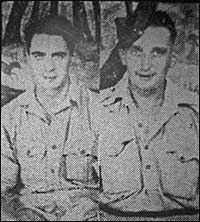 |
|
Clifford (left) and Jack
|
The Rushden Echo and Argus, 5th February, 1943, transcribed by Gill Hollis
Cousins Abroad - Rushden Boys Meet in The Middle East
Two Rushden cousins A.C.1. Clifford George Smith, a wireless operator in the R.A.F., son of Mr. and the late Mrs. E. Smith, of 170, Cromwell-road, Rushden, and Gunner Jack Smith, second son of Mr. and Mrs. W. E. Smith, of 139, Cromwell-road, Rushden, have recently met in the Middle East and had their photographs taken together.
Clifford Smith joined up two years ago and has been abroad since last May. Prior to joining up he was employed by Messrs. J. and C. Claridge, and was a member of the Park-road Baptist Church and Boys’ Brigade.
Jack Smith has been in the Army for three years and was formerly with Messrs. C. K. Woods.
|
The Rushden Echo and Argus, 12th February, 1943, transcribed by Gill Hollis
Rushden Trooper in Italy
Tall man in the centre of this picture from Italy is Trooper Harley Welsford, of Rushden. As a member of the Royal Tank Regiment he fought in the Middle East last year and became a prisoner on June 2nd. He writes once a month to his mother, Mrs. W. Bass, of 3, Jones’s Cottages, Victoria-road, Rushden, and assures her that he is well and happy.
The soldier on the right was in the same tank crew as Trooper Welsford, and the other was known to Trooper Welsford in England, being in the same battalion.
|
The Rushden Echo, 5th March, 1943, transcribed by Gill Hollis
Wounded Hand
Rushden Airman a Casualty in North Africa
Mrs. J. Thomas, of 145, Highfield-road, Rushden, has received news that her youngest son, Pte. Ernest Albert Thomas, has received wounds to the hand while in action in North Africa.
Aged 23, Pte. Thomas is a native of Wellingborough, but had been living in Rushden for some time. Prior to joining up he was employed at the C.W.S. boot factory, Rushden. He was married last April to Miss Kathleen House, of Christchurch.
Pte. Thomas has been abroad since November. His elder brother is serving with the R.A.F. in India.
|
The Rushden Echo, 26th March, 1943, transcribed by Gill Hollis
Rickshaw for Three
Rushden Sailor’s Picture from Abroad
Sent home by A.B. Jack Matthews (left), of Rushden, this picture illustrates part of his wide travels.
Though he says nothing by way of explanation, it is obvious that young Jack has been enjoying himself in South Africa, for the “grandstand” is a rickshaw and the native wears the wondrous attire of a rickshaw “boy.”
A.B. Matthews is the second son of Mr. and Mrs. W. J. Matthews, of 145, Newton-road, Rushden.
|
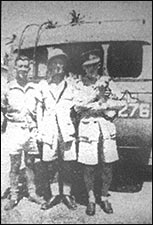 The Rushden Echo, 2nd April, 1943, transcribed by Gill Hollis The Rushden Echo, 2nd April, 1943, transcribed by Gill Hollis
Rushden Soldier in Colombo
This cheery photograph was sent by Pte. P. T. Cotton (centre), of the Army fire-fighting section attached to the Pioneer Corps in Colombo, Ceylon (where he has been serving for fifteen months) to his wife, who resides at 130, Westfield-avenue, Rushden.
|
|
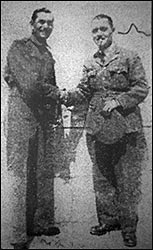 The Rushden Echo, 2nd April, 1943, transcribed by Gill Hollis The Rushden Echo, 2nd April, 1943, transcribed by Gill Hollis
Are You a Mason?
Middle East Meeting of Rushden Brothers
A meeting of two Rushden brothers took place in the Middle East about three weeks ago. The lucky pair were Wenty Mason, R.A.F. (right) and Walter Mason, R.A.S.C., sons of Mrs. E. Hart, of 7, Spencer-road, Rushden.
A.C.1 Mason was employed by Messrs. Sanders and Sanders, Ltd., and has been serving three years. L/cpl. Mason worked for Messrs. Keunen Bros., Irthlingborough, and joined the Army two years ago. Both are married, Wenty’s home being in Gravely-street, Rushden, and Walter’s at 101, Allen-road, Irthlingborough.
|
The Rushden Echo, 2nd April, 1943, transcribed by Gill Hollis
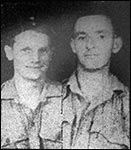 Grove-road Neighbours Grove-road Neighbours
Rushden Boys Meet in The Middle East
It must have been a great meeting for George Ambridge (left) and Bob Swingler (right) when they came together in the Middle East last October, for in the pre-war days they were next-door neighbours at 11 and 13, Grove-road, Rushden. George has been in the Forces four years, and was formerly employed by Messrs. John White, Ltd. Bob joined three years ago, having been employed by Messrs. B. Denton and Son, Ltd. The news of the meeting was received by Mrs. A. F. Swingler (mother of Bob) a few days ago.
|
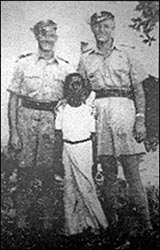 The Rushden Echo, 16th April, 1943, transcribed by Gill Hollis The Rushden Echo, 16th April, 1943, transcribed by Gill Hollis
Black and White
Rushden Marine’s Picture from Abroad
This smiling photograph of himself and two friends (one black) was sent by Marine Fred Farrington (left) to his parents, Mr. and Mrs. F. Farrington, of 55, Little-street, Rushden. Fred, who is 20, had been in the service for two years and abroad since last November, and since joining a ship in America has been to Colombo, Durban and Sydney. This photograph is believed to have been taken in Africa.
|
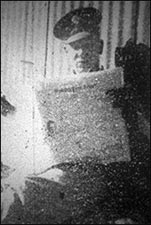 The Rushden Echo, 16th April, 1943, transcribed by Gill Hollis The Rushden Echo, 16th April, 1943, transcribed by Gill Hollis
Almost “At Home” - Rushden News for Eighth Army Guardsman
Snatching a rest during the chase of Rommel, Guardsman Cyril W. Burgess of Rushden, reads about “Home” in the “Echo & Argus.” Cyril is a son of Mr. and Mrs. W. M. Burgess, 25, Fitzwilliam-street, Rushden, and joined the Grenadier Guards in January, 1940, going overseas early last year. In civil life he was an inspector in an ordnance factory.
|
The Rushden Echo, 16th April, 1943, transcribed by Gill Hollis
Sons of D.C.M. — Rushden Boy Ill : His Brother Wounded
A/C John Butts (left) is recovering from an operation in Malta, and his brother, Pte. Dennis Butts (right), is in a North African hospital, suffering from wounds in the right arm and hand. They are the sons of Mr. and Mrs. J. R. Butts, of “Walton House,” Harvey-road, Rushden, and before joining up they served in the Rushden “B” Company, Home guard, their sergeant being their own father, who won the D.C.M. in the last war when serving with the 1st Northamptonshires in France.
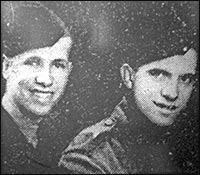
Dennis informs his parents that his wounds are not serious. Aged 20, he joined the Duke of Wellington’s Regiment just over 12 months ago and previously worked for Messrs. C. K. Woods, boot manufacturers.
John, who is 21, worked at Messrs. John White’s Lime-street factory, enlisting in the R.A.F. shortly before his brother entered the Army.
Mr. and Mrs. Butts also have two daughters, both of whom are away on munitions work.
|
The Rushden Echo, 23rd April, 1943, transcribed by Gill Hollis
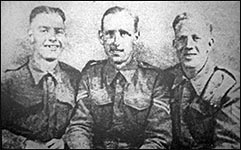
A Meeting in Cairo
These three boys spent four days’ leave together in Cairo. Cpl. Don Jackson (left) is the son of Mrs. Brown, formerly at Burton Latimer and now at the Railway Inn, Rushden. Cpl. Jack Page (right) is the son of Mr. and Mrs. G. Page, 27, Oswald-road, Rushden. Between them is Cpl. Wright, whose home town was not stated by Cpl. Page when he sent the picture.
|
The Rushden Echo, 23rd April, 1943, transcribed by Gill Hollis
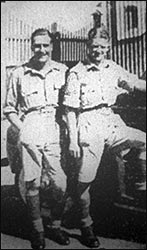 Old “Rivals” Old “Rivals”
Ex-Schoolboy Footballers in Durban
A picture from Durban to record the meeting of former schoolboy rivals – Lce-Cpl. G. Houghton, Scots Greys (left) and Cpl. Ron Bull, R.A.
Eldest son of Mr. and Mrs. A. Houghton, 28, King’s-road, Rushden, Lce-cpl. Houghton used to play for Rushden Intermediate. He worked for Messrs. Meadows Bros., hairdressers, and early in the war was married to Miss Audrey Dunmore, who lives at 5, Thrift-street, Higham Ferrers.
Cpl. Bull is the second son of Mr. and Mrs. Bull, 25, Hayway, Irthlingborough. He played schoolboy football for the Irthlingborough Council School team and afterwards assisted Rushden Town F.C.
The two friends have also met Lce.-Cpl. Houghton’s brother-in-law, Driver Hackney, of 13, George-street, Irthlingborough, another former “Russian.”
|
The Rushden Echo, 23rd April, 1943, transcribed by Gill Hollis
Towel and Gloves
Rushden Sportsmen Wielded Them on Troopship
Sergt. Instructor George Roper, formerly of Rushden Town F.C., who has gone overseas with an Army Physical Training Corps unit, writes from aboard ship with news of a surprise meeting with another well-known Rushden sportsman – the young boxer, Don Harrison.
In a letter to Mr. E. Bennett, hon. Secretary of the Rushden Serving Men’s Parcels Fund, Sergt. Roper says:-
“As the P.T. Corps we held two boxing tournaments aboard, and imagine my surprise and pleasure when I found myself seconding one of Rushden’s favourites of pre-war days, none other than Don Harrison. I am pleased to say he won both his fights aboard that ship.
“Unfortunately we are parted now, but, believe me, we had some good talks together, and it was grand to be able to bring Rushden quite close although we were thousands of miles away.
“We were 12 days together before either knew the other was aboard, so you can imagine how surprised both were. Although not so good as in his “Mill” days, Don is still quite good and was the popular vote as the best boxer on view. You bet I was pleased. I fancy the sportsmen of our town would be pleased to know my bit of news.”
George adds high appreciation of the Parcels Fund and its secretary.
|
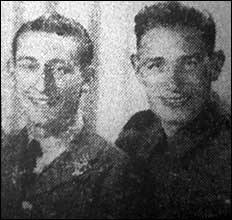 The Rushden Echo, 7th May, 1943, transcribed by Gill Hollis The Rushden Echo, 7th May, 1943, transcribed by Gill Hollis
Rushden Brothers Meet in Cairo
Two more Rushden brothers have had the pleasure of meeting in Cairo. The lucky pair are Sergt. D. R. Curtis, R.A.F., of 19 Kings-road, and Bdr. H. L. Curtis, R.A., of 26, Sartoris-road, sons of the late Mr. and Mrs. F. Curtis, of 273, Wellingborough-road. The meeting took place in January.
Sergt. Curtis, aged 24, is the youngest, and Bdr. Curtis, aged 32, the second son. Sergt. Curtis has been serving throughout the war and has been overseas for 2½ years. His elder brother, a Reservist, was in France at the time of Dunkirk, and went out East about four months ago. Both are married.
|
The Rushden Echo, 7th May, 1943, transcribed by Gill Hollis
Rushden Soldier On The Screen - A Good Close-Up in “Desert Victory”
“Desert Victory,” the famous British war film, gives an excellent view of a Rushden soldier, Lce-cpl. Leslie Rivitt, elder son of Mr. and Mrs. H. Rivitt, of 29, Denmark-road.
Lce-cpl. Rivitt can be picked out quite easily by those who know him, as the military policeman who stands directing traffic. His wife, who lives in the Isle of Wight, has already seen him on the screen, and his parents hope to see the picture at the Ritz Cinema, Rushden, next week. They have just received a copy of “Crusader,” the Eighth Army’s smart little illustrated weekly, which gives a picture in which their son is holding up traffic for a tank carrier to pass.
Lce-cpl. Rivitt worked at Rushden for Messrs. Phillips and Sons, drapers, before moving to the Isle of Wight. He joined the Army early in 1941 and in August of that year went out to the Middle East with the Corps of Military Police. He saw Mr. Churchill during the Premier’s tour last year. His only brother was killed in the Battle of El Alamein.
|
The Rushden Echo, 21st May, 1943, transcribed by Gill Hollis
Five Days Adrift in Dinghy - Rushden Airman Rescued by Arabs
Adrift in a dinghy for five days after his plane had landed on the sea, Sergt Denis Wilfred Denton, R.A.F., of 90, High-street South, Rushden, describes his adventure in a letter by air mail to his wife.
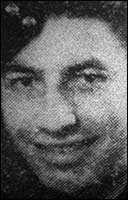 “I’m quite fit and well again,” he writes. “It was a pretty shaky do, but I came off pretty light. “I’m quite fit and well again,” he writes. “It was a pretty shaky do, but I came off pretty light.
“We had been on a raid and had started back for home, when one of the engines packed up, and about an hour later we had to land in the sea. Unfortunately it was night time, which made things rather hard for the skipper, but he did splendidly and landed the kite as good as circumstances allowed.
“Three of us managed to get out of the machine before it sank and reached the dinghy safely – at least Mac and Bob did, and they paddles around and pulled me aboard about three quarters of an hour later, after I had swallowed half the Mediterranean. We then spent five unpleasant days drifting around.
“On the fifth day an Arab sailing vessel picked us up and took us to land, so our troubles from that moment were over. We spent a week in hospital and then twelve days in a convalescent camp, and yesterday Mac and I arrived back at the Squadron.”
Sergt. Denton is with the Middle East Forces. He has four brothers in the Services.
|
The Rushden Echo, 21st May, 1943, transcribed by Gill Hollis
Rushden A.T.S. Girl Gives Blood
Wellingborough Orderly Attended her in Egypt
When Pte Vera Travill, a Rushden A.T.S. girl in Egypt was giving a pint of her blood for transfusion purposes, she found that the hospital orderly who was extracting the blood was a Wellingborough man, Ken Neal.
“He was so pleased to talk to me,” she writes, “and I was able to tell him a few things about home. I was sorry when my pint of blood was through, because we were having such a good chin-wag.”
Vera has been in the A.T.S. since August, 1941, and was one of the first Rushden girls to go overseas.
|
The Rushden Echo, 28th May, 1943, transcribed by Gill Hollis
Wounds Healed - Rushden Soldier Rejoins North Africa Unit
Mr. and Mrs. A. Knight, of 119, Cromwell-road, Rushden, have been informed that their youngest son, Pte. Dennis Knight, was wounded on April 7th while serving with the 1st Army in North Africa, but has since been discharged from hospital and has rejoined his unit.
Pte. Knight, who is 23 years of age, has been in the Army nearly four years, going overseas last November. He had worked for Messrs. Jaques and Clark, boot manufacturers, and as a boy attended the Newton-road Schools. Two brothers are serving with the R.A.F., one being in India.
|
The Rushden Echo, 28th May, 1943, transcribed by Gill Hollis
Wounded in Arm - Rushden Bandsman in African Hospital
Pte. Ernest Clarke, serving in North Africa, has informed his mother, Mrs. C. Clarke, of 15, Pemberton-street, Rushden, that he has been wounded in the left arm while serving with the Tank Regiment and is in hospital.
Pte. Clark is 37 years old and has been in Africa for four months and in the Army for three years. His wife, Mrs. G. Clarke, resides at 68, Cromwell-road, Rushden, and they have a son and a daughter. Pte. Clarke formerly worked for the United Counties Omnibus Co. and was a member of the Rushden Town Band.
|
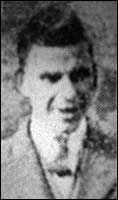 The Rushden Echo, 28th May, 1943, transcribed by Gill Hollis The Rushden Echo, 28th May, 1943, transcribed by Gill Hollis
Back to Unit - Rushden Man’s Good News from Tunisia
An airgraph letter dated May 10, received on Wednesday by Mr. and Mrs. E. Bridgeford of 59, Irchester-road, Rushden, from their second son, Gnr. Robert “Butch” Bridgeford, in North Africa, was a thrilling surprise, for a fortnight previously the War Office informed them that he had been missing since April 21.
Gnr. Bridgeford is nearly 20 years old and has been serving for seven months with the Northamptonshire Regiment, going overseas two months ago. He has a brother in the Airborne Troops.
From Gnr. Bridgeford’s message it appears that he was taken prisoner but afterwards rejoined his unit.
|
The Rushden Echo, 4th June, 1943, transcribed by Gill Hollis
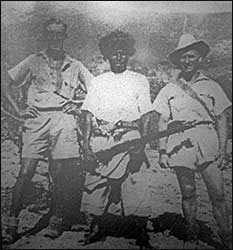 |
|
Tony Clark (left) with a colleague and their bodyguard
|
Life in an Outpost - Rushden Airman the Guest of a Sultan
At a tiny outpost in South Arabia, their neighbours the most primitive of any Arab race, a company of R.A.F. men are living the strangest life of this war. One of them is L.A.C. A. P. (Tony) Clark, elder son of Mr. and Mrs. A. Clark, of 20, Tennyson-road, Rushden.
They live on the fringe of a region into which only a handful of white men have ever dared to venture, and their supplies can only come to them by air or from one of the rare ships which unload at a tiny jetty which the men have built themselves.
On one side they have a mountain range, behind which lies unexplored country and savage tribes, and only a few miles away is the broad expanse of the Indian Ocean. For weeks they were alone, making an aerodrome out of a stretch of sandy desolation, but now they have daily visitors – R.A.F. air crews who are landing to refuel, catch a meal and spend the night on their way to the Eastern battle zone.
This little community is now seeing itself as it was visualised months ago – a link in a chain of supply which is sending more aircraft to blast the Japanese out of the Eastern Seas.
Not so long ago they had only themselves for company, but now they are talking to men who perhaps just a matter of days go were fighting the Luftwaffe over the continent of Europe, or helping to drive the Axis from its last bases in Africa.
These men are a bastion in a dimensional warfare embracing three continents. R.A.F. personnel at this station were the first body of foreign troops seen in the area since a handful of Portuguese navigators landed centuries ago and built a fort. They are now the guests of a Sultan, who before the war was a visitor to many of the great capitals of the world, and his personal bodyguard is responsible also for the protection of the R.A.F. unit.
That is why when an aircraft lands the visitor will see fierce looking men approach. They carry modern Lee Enfield rifles and a wicked silver mounted dagger in their belt.
Whenever a member of the R.A.F. goes beyond the aerodrome’s barbed wire boundary – and to do this a pass has to be issued by the Sultan – one at least of these guards must accompany him. Thus on bathing parties, a guard rides with the lorry and stands guard at the beach.
When the men were building the jetty the guards went along too, and they also go with the R.A.F. hunting parties organised about once a month. These hunts are a privilege granted by the Sultan, who has stipulated, however, that only two animals must be shot on each expedition. Gazelles are usually the victims, and they form a useful addition to the camp menu.
Luxury in Huts
On any expedition to the Arab village nearby the Sultan has decreed that R.A.F. men must not smoke, and another of the ruler’s regulations is that no foreign flag must be flown at the camp. As a result this is possibly the only R.A.F. camp in the world where a visitor will not see the familiar sky-blue rondelled ensign flying.
Another stipulation to which the service has agreed is that between sunset and half an hour afterwards there will be no music in the camp. This is the time the local population is at evening prayer, and the camp’s wireless set is always silent.
For some time food was only from a tin, with biscuits as a regular substitute for bread, but now that more aeroplanes are passing through, the food is better, and a regular twice weekly air service is bringing fresh fruit and vegetables.
Mostly the men live in huts made of straw matting, super-imposed on a lath framework – the luxury homes are lined with cardboard containers of petrol tins. Mosquitoes abound, but fortunately they are not dangerous.
L.A.C. Clark joined the R.A.F. in March, 1941, and has been abroad 18 months. For 12 months he was in Aden, then going to the Arabian outpost. He worked for Messrs. Nicholson, Son and Daniels, Wellingborough, after attending Wellingborough Grammar School, and was connected with St. Peter’s Social Club and St. Mary’s Rover Scouts.
|
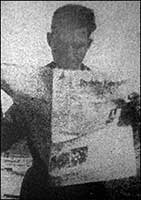 The Rushden Echo, 4th June, 1943, transcribed by Gill Hollis The Rushden Echo, 4th June, 1943, transcribed by Gill Hollis
Home News - Rushden Soldier Enjoys It “Out There”
This photograph of Craftsman Clifford Taylor, R.E.M.E., absorbed in his copy of the “Rushden Echo and Argus,” has been received by his wife, Mrs. D. A. Taylor, at “The Bell Inn, Odell.
Before Craftsman Taylor’s call-up nearly three years ago he lived in Griffith-street, Rushden, and he has now served in the Middle East for two-and-a-half years. His parents are Mr. and Mrs. J. S. Taylor, house furnishers.
|
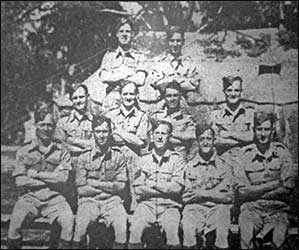 The Rushden Echo, 11th June 1943, transcribed by Gill Hollis The Rushden Echo, 11th June 1943, transcribed by Gill Hollis
Rushden Lads in Africa
Every soldier on this picture is a Rushden man. It is the most interesting photograph ever received in Rushden from North Africa, where these warriors of the first Army have all been serving in the same battery of the Royal Artillery. They went overseas in February of this year.
Top row (Left to right): Gnrs. R. and C. Watts, brothers, Cromwell-road. Second row: Gnr. E. Parker, Tennyson-road, Gnr. Ted Kirby, St. Margaret’s-avenue, Gnr. L. Abbott, Denmark-road, Bdr. G. Webb, Newton-road. Front row: Gnr. C. Dixon, court Estate, Gnr. G. Tew, St. Margaret’s-avenue, Sergt. F. Dilley, Oval-road, Gnr. A. Thurlow, Chester-road, Lce-Bdr. J. Warrington, Carnegie-street.
|
|
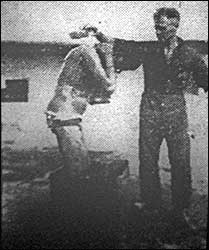 The Rushden Echo & Argus, 20th August, 1943, transcribed by Gill Hollis The Rushden Echo & Argus, 20th August, 1943, transcribed by Gill Hollis
Cooler Now! - Rushden Airman’s Good Deed In Iraq
“This,” writes Corpl. Eric Ashby, R.A.F., “is me washing a coolie by the name of Abbas Mohamed.” They’re glad of a tub in Iraq, where Cpl. Ashby has been stationed during the last 18 months, for a shade temperature of 121 is nothing unusual – and there’s not much shade, either.
Cpl. Ashby is 31, and his home is at 174, Cromwell-road, Rushden. Formerly manager of the Co-operative butchery in Birchall-road, he is butcher and cook for his unit and has to make his own ovens to do the cooking in. He is a member of the Rushden Athletic Club and is fond of fishing and – in civilian life – shooting.
|
|
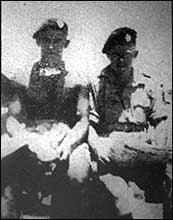 The Rushden Echo & Argus, 20th August, 1943, transcribed by Gill Hollis The Rushden Echo & Argus, 20th August, 1943, transcribed by Gill Hollis
Home News in The Desert - Rushden Newsagent and His Woodford Friend
Sunday morning in the desert – but not a Sunday paper. It’s just the “Echo and Argus” being devoured by two lads who have been fortunate in being together ever since joining up two-and-a-half years ago.
On the right is J. Parker, newsagent and Toc H member, of Station-road, Rushden. He sends thanks to the Rushden Serving Men’s Parcels Fund “for continuation of gifts and good wishes” and reports that he has been able to start a Toc H circle in his unit.
The other man is D. Jackson, of “West View,” Woodford. Both, as the picture makes evident, are in very good health. They had not met before joining the Army.
|
|
The Rushden Echo & Argus, 20th August, 1943, transcribed by Gill Hollis
Rushden Sergeant’s Lucky Meeting - U.S.A. Friend Turns Up in Tunisia
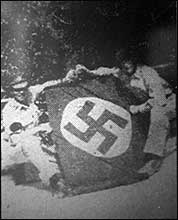 With the picture below came the following letter from Sergt. R. Fensome, of the Military Police, Middle East Forces:- With the picture below came the following letter from Sergt. R. Fensome, of the Military Police, Middle East Forces:-
“While serving in the Metropolitan Police in London in 1937, I made the acquaintance of a visiting American and we used to go places together quite frequently. After a few weeks together my friend returned to America and we lost touch with one another.
“When the 1st and 8th Armies met in Tunisia one of the first American soldiers I saw was my former friend Albert Huson, of Detroit. Naturally we had a small celebration on French wine, which concluded with the usual photography experiments. Here is one of them taken with a Nazi flag which came into my possession on the way up from El-Alemein with General Sir Bernard Montgomery, or plain ‘Monty’ to the troops!
“I am a Rushden man myself and my wife and parents reside at “Clarabert,” St. Margaret’s-avenue. I am now serving with the Military Police in the Middle East.”
|
|
The Rushden Echo & Argus, 20th August, 1943, transcribed by Gill Hollis
Three Events to Celebrate - Great Occasion for Young Air Officer
This week-end means a triple celebration for Pilot Officer Reg Leach, a former member of the “Echo and Argus” editorial staff, now serving in the Royal Air Force.
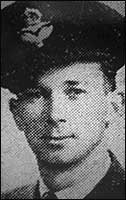 Pilot Officer Leach, who is the elder son of Mr. and Mrs. S. G. Leach, of Midland-road, Rushden, announces his engagement to Miss Freda Dobson, of Hayes, Middlesex, this week-end. On Monday there is a second cause for rejoicing when he celebrates his 21st birthday, and the third reason for jubilation is the attainment this month of 1,000 hours flying as an R.A.F. pilot. Pilot Officer Leach, who is the elder son of Mr. and Mrs. S. G. Leach, of Midland-road, Rushden, announces his engagement to Miss Freda Dobson, of Hayes, Middlesex, this week-end. On Monday there is a second cause for rejoicing when he celebrates his 21st birthday, and the third reason for jubilation is the attainment this month of 1,000 hours flying as an R.A.F. pilot.
Three years ago Pilot Officer Leach left the “Echo and Argus” to put on uniform. Since then he has served for two years as a flying instructor, and it was during the latter half of this time, while stationed near Oxford, that he met his fiancée, Miss Dobson, who is 20 years of age, is employed in the meteorological branch of the Air Ministry.
A recent posting took Pilot Officer Leach up into Scotland, where he now serves with Fighter Command. The great distance from his home town, combined with the calls of Service duties, will prevent a celebration by family and friends in Rushden until a later date, but it is expected that the week-end will not pass uneventfully at an R.A.F. station somewhere in Scotland.
|
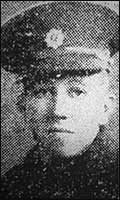 The Rushden Echo and Argus, 10th September, 1943, transcribed by Gill Hollis The Rushden Echo and Argus, 10th September, 1943, transcribed by Gill Hollis
Rushden Man’s Rescue from Sea Recalled
A message sent by Craftsman Harry Pack, R.E.M.E., to his parents, Mr. and Mrs. F. A. Pack, of 17, Gordon-terrace, Higham-road, Rushden, told of his enjoying seven days’ leave in Alexandria while off duty from service in the Middle East.
Craftsman Pack is 24 years of age and has had some thrilling escapes in his three-and-a-half years’ service. He was evacuated from France and was on a ship when it was bombed off San Nazaire, being in the water for three hours and rescuing a Belgian lady who has since corresponded with his parents. His next journey took him to the Middle East where he has been for 19 months.
|
The Rushden Echo and Argus, 3rd September, 1943, transcribed by Gill Hollis
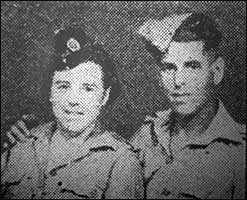 Met Brother in Middle East - Rushden A.T.S. Girl’s Hope Fulfilled Met Brother in Middle East - Rushden A.T.S. Girl’s Hope Fulfilled
When Pte. Vera Travill, A.T.S., Rushden, volunteered for service in the Middle East her chief motive was the hope that she would meet her brother Eric out there. She arrived in Egypt early this year, but Eric, who is a gunner in the Royal Artillery, was chasing the Axis into Tunisia, and the chance of a meeting seemed remote.
Now, however, by an unexpected turn of events, the brother and sister have met – thousands of miles from their home. They had a “real good time” together and posed for the picture which is reproduced above.
Vera, aged 23, is the eldest daughter of Mr. and Mrs. Harry Travill, 14, Trafford-road, Rushden, and has been in the A.T.S. two years. Eric, aged 21, is the eldest son; he was called up as a Territorial in 1939.
Their brother, Gnr. Cecil Travill, R.A., went out to Tunisia early this year, but was not lucky enough to contact Eric.
|
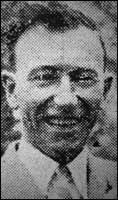 The Rushden Echo and Argus, 1st October, 1943, transcribed by Gill Hollis The Rushden Echo and Argus, 1st October, 1943, transcribed by Gill Hollis
Sportsman Wounded in Foot - Rushden Footballer Now in Egyptian Hospital
Marine George Edward Dowsett, Royal Marine Commandos, of Rushden, has been wounded in the foot and is in hospital in Alexandria. He has himself sent the news to his wife, who lives at “Lincoln House,” Carnegie-street, and an official message has also been received.
Marine Dowsett is 29 years of age and has been in the Marines for 10 months, six of which have been spent abroad. He was formerly employed by Messrs. E. Woodley and Sons, leather manufacturers, Higham Ferrers, and is well-known as a sportsman, playing football for Rushden Town and cricket for Higham Ferrers Town.
|
The Rushden Echo and Argus, 15th October, 1943, transcribed by Gill Hollis
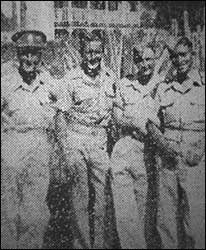 Four Pals in Cairo - Rushden Boy’s Message to Windmill Club Four Pals in Cairo - Rushden Boy’s Message to Windmill Club
L/Cpl Frank Hales, R.A.O.C. serving in the Middle East, sent this happy snapshot of himself and three pals (also local boys) to his wife, who resides at 109, Westfield-avenue, Rushden.
Left to right are L/Cpl Hales, Walt Austin, of Irthlingborough, and Tom and Jack Chester, the two sons of Mr. Chester, baker and confectioner, of Irthlingborough.
L/Cpl Hales writes: “Myself and Tom Chester are both in the same unit, sleeping in the same tent, and Walt is only a mile away. When the snap was taken Jack was down on leave after a long spell up the desert with a light A.A. unit, and we all arranged to meet in Cairo, where this snap was taken. We had a jolly good half-day together and a drink at night – spirits only, as beer is practically unobtainable here at night just now. I send best wishes to my old friends at the Windmill Club, where I used to spend many happy hours on the billiard tables. Hoping we shall all be back with you soon.”
L/Cpl Hales served for five months with the Home Forces before going to Egypt over two years ago. Before joining up he worked for Messrs. A. E. Wright, Ltd., of Higham Ferrers. His parents are Mr. and Mrs. George Hales, of 52, Moor-road, Rushden.
|
The Rushden Echo and Argus, 22nd October, 1943, transcribed by Gill Hollis
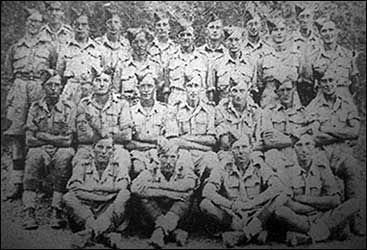
Northamptonshires Abroad
Boys of the Northamptonshire Regiment from this group which Pte. Dennis Knight, of Rushden (second from left, front row), has sent home from the Central Mediterranean, and some will doubtless be identified by our readers.
Aged 24, Pte. Knight is the youngest son of Mr. and Mrs. A. Knight, 119, Cromwell-road, Rushden. He joined the Army in the early days of the war and went out to North Africa with the 1st Army, being wounded in the fighting last April. His two brothers also serve in the Forces, and one of them, like Dennis, has been in North Africa.
|
The Rushden Echo and Argus, 22nd October, 1943, transcribed by Gill Hollis
Met In India - Rushden Neighbours and Fellow Bandsmen
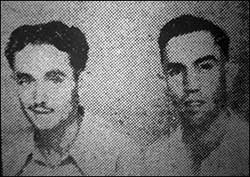 Neighbours in peacetime, L.A.C. Gordon Eades and his friend, Cpl. Herbert Underwood, R.A.F., travelled hundreds of miles across India to meet each other, and spent a wonderful time together, as their parents, at 83 and 77 Westfield-avenue, Rushden, recently heard. Neighbours in peacetime, L.A.C. Gordon Eades and his friend, Cpl. Herbert Underwood, R.A.F., travelled hundreds of miles across India to meet each other, and spent a wonderful time together, as their parents, at 83 and 77 Westfield-avenue, Rushden, recently heard.
L.A.C. Eades (on left of the photograph, which was taken on the occasion of the meeting) has seen service in Singapore and Rangoon, and has spent three Christmases abroad. Before joining the R.A.F. he was employed by Messrs. Eaton and Co., Irchester-road. Cpl. Underwood was employed by Messrs. Jaques and Clark.
Both boys were members of the Rushden Mission Band. Another link between them is that Herbert’s W.A.A.F. sister, Eva, is Gordon’s fiancée.
|
The Rushden Echo and Argus, 22nd October, 1943, transcribed by Gill Hollis
Calling Gibraltar - Rushden Wife Broadcasts to Airman Husband
Mrs. Margaret George, of St. Margaret’s-avenue, Rushden, travelled to a B.B.C. studio to speak to her husband, L.A.C. Jim George, R.A.F., serving in Gibraltar, in the programme “Calling Gibraltar,” broadcast on the short-wave Overseas Service on Tuesday evening.
Mrs. George in her message said: “It is grand talking to you again on our wedding anniversary.”
L.A.C. George has been with the R.A.F. for two years, and has served in Gibraltar for 11 months. Before call-up he worked in the C.W.S. bakery dept. at Raunds.
Mrs. George, of 5, Blotts Gardens, Raunds, L.A.C. George’s mother, was listening to the broadcast, as also were Mrs. J. George’s parents, Mr. and Mrs. Hudson, in London.
|
The Rushden Echo and Argus, 29th October, 1943, transcribed by Gill Hollis
Marine Missing - Rushden Man Was Aboard Torpedoed Cruiser
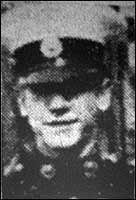 Aboard H.M.S. Charybdis, the cruiser recently sunk by German torpedoes near the French coast, was a Rushden man, Marine Frederick George Wallis, aged 25. He is officially listed as missing, but the enemy claims to have landed some survivors, and it remains to be seen whether he was one of these. Aboard H.M.S. Charybdis, the cruiser recently sunk by German torpedoes near the French coast, was a Rushden man, Marine Frederick George Wallis, aged 25. He is officially listed as missing, but the enemy claims to have landed some survivors, and it remains to be seen whether he was one of these.
Marine Wallis is a son of the late Mr. and Mrs. John Wallis, of Bedford-road, Rushden, and as a boy attended Rushden South End School. Afterwards he worked for Messrs. Walter Sargent and Co., boot manufacturers, and took up boxing at the Windmill Hall, appearing as a novice in one or two of the tournaments there. After the death of his parents he made his home with a sister, Mrs. Mallows, of 31, Wellington-road, Raunds.
Joining the Marines seven years ago, he was destined for many hard experiences during the war, being on the ill-fated “Courageous,” the “Barham” and other famous vessels. Wounded in the lung, he came to England for hospital treatment, and on completing his convalescence was posted to the “Charybdis.”
He has been married during the war, and his wife resides in the South of England.
|
The Rushden Echo and Argus, 1st October, 1943, transcribed by Gill Hollis
Devil Dancing and Jap Bombs - Rushden Man’s Four Years in Ceylon
Reaching England from Ceylon after four years’ absence was described by Mr. Clifford Sears, of 49, Roberts-street, Rushden, as the happiest event of his life.
Mr. Sears found himself in difficulties, however, having yet to discover what “Spam” was, or how to use buttons A and B in a ‘phone box.
A civil servant for the Admiralty, he left England just after the declaration of war and became deputy naval store officer in the dockyards of Trincomalee and Colombo.
Heavy work and some narrow escapes came his way after Japan had entered the war. Once, when the sirens sounded, he assumed it was for practice, and went out on the verandah of the waterfront hotel. It was a real raid, however, with Spitfires and warships’ A.A. batteries in action against the Japs, and he had to dive under a table as bombs fell close by. He was probably the last civilian aboard the “Cornwall” before it was sunk in 1942.
He had only three weeks’ leave during the four years, and two 10-day periods were spent at a hill station where there are recuperation camps for troops, with very pleasant country surroundings and golfing facilities.
Strange Festivals
The ancient ruined cities of Ceylon were interesting places for exploration. Mr. Sears saw Hindu religious festivals at a temple near Trincomalee, where penitence was carried out in the form of rolling or crawling along a road for four miles. In what he believed to be devil dancing, a man was pulled to and fro by means of ropes hooked to his back, and worked himself into a frenzy.
Though agreeing that the island is pretty, Mr. Sears thinks it hardly deserves its title as “the gem of the Indian Ocean.” It is rather disfigured by lower-class native houses built of rolled-out petrol tins and a thatch made from palm trees.
There is no real system of rationing for civilians, but rice is a great problem for the natives, and on one occasion there were no potatoes for two months until a fresh supply arrived from India.
Well Met
Mr. Sears met several local “boys” in the Services out there, among them Frank Bishop (whom he met accidentally in the lounge of an hotel), Reg Brown, an ex-police sergeant’s son, Albert Chambers, who was at one time serving on the “Eagle” and Jim White, who was subsequently drowned. At a Rugby match he met Gerald Ekins, whom he had known at school.
The return journey was comparatively uneventful, but depth charges were dropped by the escorting vessels, and Mr. Sears learned from Peter Woods, another local boy on one of the ships, that a “probable” had been scored. The trip took ten weeks, including three at Cape Town, where again he was fortunate in meeting further friends – a family he had met at Sheerness five years previously, and who were now returning from Rhodesia.
Back in England, and home once again in Rushden, he was struck by the number of air raid shelters that have sprung up. The absence of young people is noticeable, too. The rationing here he does not find too bad, and the prices of commodities are not so high as he expected.
Many interesting souvenirs now repose in the Roberts-street home – elephants of various sizes, dishes, plates, finger bowls, and a cocktail set of painted wood are a few of them.
|
|
The Rushden Echo and Argus, 5th November, 1943, transcribed by Gill Hollis
Their Day Out - Old Rushden School Chums Meet Abroad
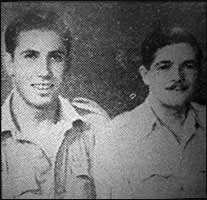 Taken on the occasion of their reunion in the Middle East, this picture of two Rushden “boys” who were old school pals at Newton-road has just been received by the wife of L.A.C. Clifford Lawman (on right), of 40, Winchester-road, Rushden. On the left is A.C. Kenneth Ablett, whose mother lives at 18, Denmark-road, Rushden. Taken on the occasion of their reunion in the Middle East, this picture of two Rushden “boys” who were old school pals at Newton-road has just been received by the wife of L.A.C. Clifford Lawman (on right), of 40, Winchester-road, Rushden. On the left is A.C. Kenneth Ablett, whose mother lives at 18, Denmark-road, Rushden.
Clifford Lawman, whose father is Mr. Harold Lawman, of 156, Wymington-road, Rushden, went overseas 18 months ago. He used to work for P.X. Ltd. Kenneth Ablett has been abroad about 2½ years.
The meeting took place a month ago, and the friends had a whole day together.
|
|
The Rushden Echo and Argus, 5th November, 1943, transcribed by Gill Hollis, transcribed by Gill Hollis
First to Greet Repatriates - Distinction Claimed by Rushden Sailor
The distinction of being the first person to greet the repatriated prisoners of war from Germany at Leith last week is claimed by a Rushden man, A.B. Edward Shipman, of the Royal Navy.
In a letter home A.B. Shipman writes: “I consider myself to have been the first to greet them on arrival at Leith. This was done through a loud ‘hailer’ as they came on. I got what I considered to be the loudest cheer when I told them what was waiting for them at the dockside – cigarettes, beer, chocolate, fruit and tea on tap.”
The fact that his voice was the first the returning Britons heard was confirmed by Pte. Sidney Hare, R.A.M.C., of Higham Ferrers, who was among them.
A.B. Shipman is the son of Mr. and Mrs. J. H. Shipman, of 87, Hayway, Rushden, and has been with the Navy for three years. He has seen service overseas but was brought back to this country on account of ill health, and is at present serving with the Home Fleet.
|
|
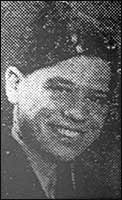 The Rushden Echo and Argus, 5th November, 1943, transcribed by Gill Hollis The Rushden Echo and Argus, 5th November, 1943, transcribed by Gill Hollis
Aircraftman on Missing List - Serving In Middle East
A.C.1 Arthur Sears, R.A.F.V.R., serving in the Middle East, has been reported “missing through enemy action.” His mother, Mrs. E. N. Sears, of 4, Dayton-street, Rushden, received this information from the Air Ministry on Saturday, the telegram further stating that enquiries were being made through the International Red Cross.
A.C.1 Sears has been with the R.A.F. since June, 1940, and in the Middle East since March, 1942. He is 23 years of age and formerly worked for Mr. J. W. Barker, Leather dresser, Higham Ferrers.
|
|
The Rushden Echo and Argus, 19th November, 1943, transcribed by Gill Hollis
Victoria Hotel in Canvas - Rushden Names Grace the Mediterranean
Rushden lads of the North Africa Forces have their own “Victoria Hotel” and “Rock” just to remind them of home.
Acknowledging a gift from the Rushden Service Men’s Parcels Fund, L/Bdr. Charles B. Watts, Royal Artillery, writes: “My unit is 50 per cent. Northants lads and 50 per cent. Leicestershire lads, and in our tent all are Rushden lads like myself. Names are George Tew, Bud Abbott, Frank Dilley, Jack Warrington, George Webb, Cecil Dixon and my brother Ted.
“Believe me, we are a happy band of Rushdenites. You have perhaps seen a photo of us all. We have named our tent the “Victoria Hotel” after the Vic. in High-street, and a path which leads to the guns “The Rock” after Cromwell-road, where I live.
“So here is wishing you and all the good people of Rushden a very happy Christmas and victory in the New Year.” |
|
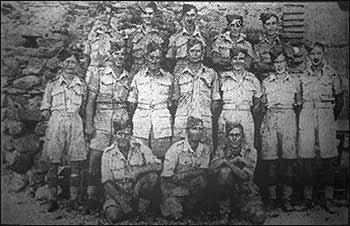 The Rushden Echo and Argus, 19th November, 1943 The Rushden Echo and Argus, 19th November, 1943
Local Lads in Sicily
Pte. Arthur Bass, of Hinwick Home Cottages, has sent this photograph from Sicily.
He is seen on the top row, second from left, and some Rushden men are also in the group of smiling warriors.
|
|
The Rushden Echo and Argus, 19th November, 1943, transcribed by Gill Hollis
Fought in Desert Two Years - Gunner on “Comic Opera” Italians
Home on special leave after two years of fighting and toiling along the desert tracks is Gunner E. W. Penn, of Rushden, formerly financial secretary to the Rushden Town Football Club. He possesses the authentic 8th Army complexion and is enthusiastic about the way the campaign has been organised out there.
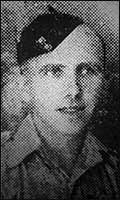 Before joining a famous regiment in August, 1940, Gnr. Penn was in the offices of Parsons and Co., Irchester. His father resides in Gravely-street, Rushden. Before joining a famous regiment in August, 1940, Gnr. Penn was in the offices of Parsons and Co., Irchester. His father resides in Gravely-street, Rushden.
Gnr. Penn went out to the desert after a few months in Palestine and was soon in touch with the Axis. His job was to help knock out tanks, and he saw many a target well and truly hit – usually “over the sights.” In those days both armies had their turns of advance and retreat. The British pushed the Axis to El Aghila, and the Axis replied with a push of their own. Then at Sidi Rezegh, a bomb splinter wounded Gnr. Penn in the leg.
He returned to his unit in time to take part in the long slow retreat to Knightsbridge, where the fighting was the fiercest he ever experienced. Just over 12 months ago his battery moved forward from El Alamein to begin the victorious sweep right through to Tunisia.
Under The Stars
Every night the troops slept in the open. They rarely stopped except to sleep or fight, but Gnr. Penn was able to spend one day in Tripoli which, thanks to Italian architecture and love of monuments, has become in his opinion a gaudy place. The palm trees, however, were appreciated, and so were the eggs which the people sold in large quantities to the conquering troops. The British boys also thought that the people in the Italian-occupied countries looked cleaner than the Egyptians.
Gnr. Penn praises the magnificent work of the Royal Engineers in disposing of thousands of mines all along the route and in restoring blown-up roads. He says the R.A.S.C. did a great job of work in keeping up supplies of food. The Italian Army in elaborate uniforms was “comic opera” to our boys.
“The troops,” said Gnr. Penn, “are in very good fettle out there. They reckon they are getting a step nearer England.”
Saw Montgomery
One day he saw Montgomery, who gave a crowd of Tommies sweets and cigarettes. At one time or another he saw most of the other famous generals, among them Cunningham, Auchinleck and Ritchie. Everywhere he went Mr. Churchill was looked up to with respect and admiration.
When he was in Cairo he saw Wally Hammond batting in three cricket matches, during which he scored over 300 runs without losing his wicket. At entertainments for the troops Gnr. Penn saw Gracie Fields, Nat Gonella, George Formby, Vivienne Leigh, Dorothy Dickson and Leslie Henson.
Rushden, he says, “definitely seems a bit quiet.” One of the first things he noticed was that the iron railings had gone, but he thinks the streets look better without them. Throughout his travels he received the “Rushden Echo and Argus” with remarkable regularity, but he never met another Rushden man until, on the way home, he encountered Frank Swingler, of Grove-road.
|
|
The Rushden Echo and Argus, 19th November, 1943, transcribed by Gill Hollis
Safe and Well - Good News of “Missing” Rushden Airman
The pleasing news that their only son, Flying Officer Ernest Charles Jaques, R.A.F., recently reported missing, is safe and uninjured, was received by telegram on Saturday by Mr. and Mrs. W. Jaques, of 16, Tennyson-road, Rushden.
Flying Officer Jaques is 29 years of age and is serving in the Central Mediterranean. |
|
The Rushden Echo and Argus, 26th November, 1943, transcribed by Gill Hollis
Baled Out from Blazing Plane: Hid in Cave
Italian Peasants Fed Rushden Airman Every Night
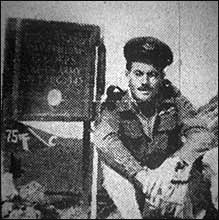 Hiding in a cave after baling out of his blazing plane behind the German lines in Italy, Flying Officer Ernest Charles (Bill) Jaques, of Rushden, lived for a fortnight on food supplied by Italian peasants, and then succeeded in rejoining the advancing British Forces. Hiding in a cave after baling out of his blazing plane behind the German lines in Italy, Flying Officer Ernest Charles (Bill) Jaques, of Rushden, lived for a fortnight on food supplied by Italian peasants, and then succeeded in rejoining the advancing British Forces.
The brief news that he was safe and uninjured reached his parents, Mr. and Mrs. W. Jaques, of 16, Tennyson-road, Rushden, a fortnight ago, and was published in the “Echo and Argus.” Now, by cable and airmail, he has reported being “fitter than ever” after chasing up and down mountains on peasant food. He also mentions “celebrating” with another lad who had escaped, and that he had “a beard still flourishing.”
A full story, however, has been cabled to England by Press correspondents on the Italian front, and was published in London papers yesterday (Thursday).
Jaques and his crew (states the “Daily Herald”) had to bale out when their ’plane caught fire. They separated in the drop.
Jaques found his cave and lay there each day watching German general staff officers and troops pass on the roads below the mountain.
Every night he crept from the cave to a village where Italians gave him food and drink and a bed.
Later he contacted his observer and wireless operator through the help of an Italian peasant and the three hid together in the cave.
They saw R.A.F. ’planes bomb the roads and made bets as to how many motor vehicles would be hit. After some days the three men separated again for safety’s sake.
Chased by Germans
On one occasion the ex-policeman pilot saw two parachutes dropping. He went out and found the two airmen were South Africans and guided them to his secret cave, out-witting the Germans who chased them through the woods.
Gradually our troops came nearer to the mountain and then Jaques and the two South Africans made their way through the retreating enemy into our lines.
Aged 29, F/O Jaques is an old boy of Rushden Intermediate School and used to sing in the choir of the Independent Wesleyan Church. For some years before joining the R.A.F. he served in the London Metropolitan Police, and in August, 1937, he was awarded the certificate of the Royal Humane Society for rescuing a man from the Thames.
He went abroad with the R.A.F. in January, 1942, won his commission and wings in South Africa in November, 1942, and followed the Axis from Egypt to Tunis, across to Sicily and into Italy.
The photo, received recently, shows him at the top of Mount Etna after a climbing expedition.
F/O Jaques’s father is a well-known member of the Rushden British Legion Committee.
|
|
Rushden Echo and Argus, 3rd December, 1943, transcribed by Gill Hollis
Rushden Man on H.M.S. Blenheim
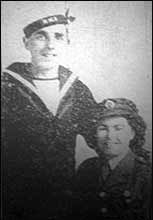 A Rushden man, A.B. Stoker William C. Harris, is among the company of H.M.S. Blenheim, the “floating workshop” which has received much publicity during the last few days. A Rushden man, A.B. Stoker William C. Harris, is among the company of H.M.S. Blenheim, the “floating workshop” which has received much publicity during the last few days.
For 18 months after being commissioned the “Blenheim” was in Icelandic waters servicing many types of ship from destroyers downwards, and seldom had fewer than six ships alongside her. So quickly were the repairs carried out that ships which had had to leave a convoy were able to catch up with it before it reached its destination.
The “Blenheim” also supplied meat, vegetables and bread to hundreds of ships, and its bakery turned out 1,250,000 lbs. of bread in 18 months.
A/B Harris is the second son of Mr. and Mrs. J. Harris, of 121, Cromwell-road, Rushden. He married in May of this year Miss Ivy King, of 30, Brookfield-road, who is at present serving with the A.T.S. He is 21 years of age and joined the Navy two years ago, having been an employee of Messrs. John Cave and Sons and a member of the Rushden Home Guard. Two brothers are with the Forces – one in the R.A.F. and another in the Navy.
|
|